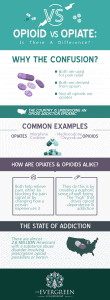With the opioid epidemic continuing to rage across the country, many people may still be confused about what opioid medications are. Additionally, some medications may be classified as opiates. Are these medications the same? What are the differences? It is important to learn about these addictive prescription drugs if you or a loved one are showing signs of addiction.
Our opioid addiction treatment program helps people who are struggling to quit opioid or opiate medications. Our team of medical professionals and recovery specialists know how important it is to provide compassionate, supportive care to those on the road to recovery. Finding support in sobriety can be critical for your success. Don’t delay your journey to a happier, healthier future. Call 888.483.6031 or connect with us online today to get started in substance abuse treatment at Northpoint Seattle.
Opioids vs. Opiates: What’s the Difference?
Though many people often use the terms opioids and opiates interchangeably, there are some notable differences between the two classes of drugs. Opioids are a broader class, often encompassing all natural and synthetic opioid drugs. Opiates, on the other hand, typically only describe medications directly made from the opium poppy.

What Is an Opiate?
Opiates are drugs that come from the opium poppy, a flower with a natural substance called alkaloids. These alkaloids can be extracted to create medications like codeine and morphine. Opium was once commonly used as a pain reliever and is still used in some parts of the world today.
Common Opiates
Some of the most common opiates include:
- Codeine
- Morphine
- Heroin
What Is an Opioid?
Opioids are a class of drugs that includes all opiates and synthetic drugs with opioid effects. These drugs bind to opioid receptors in the brain and nervous system. Opioids can relieve pain, but they also have the potential to produce a feeling of euphoria.
This euphoria is one of the main reasons opioids are so addictive. People who use opioids regularly can develop a tolerance to the drug. This tolerance means they must take higher doses to get the same euphoric effects. Over time, this can lead to physical and psychological dependence on opioids.
Common Opioids
Some of the most common opioids include:
- Oxycodone (OxyContin)
- Hydrocodone (Vicodin)
- Fentanyl
Comparing Opioid vs. Opiate Medications
Two Sides of the Same Coin
While there are some distinctions between opioids and opiates, they are similar in many ways. Both classes of drugs:
- Are derived from the opium poppy
- Can be used to relieve pain
- Have a high potential for abuse and addiction
- Have similar side effects
The Differences Between Opioid and Opiate Prescriptions
Though they are similar, some key differences exist in how doctors prescribe opioids and opiates. Opioids are typically only prescribed for pain that is severe enough to require around-the-clock relief. Opiates, on the other hand, may be prescribed for moderate pain that can find relief with less potent medications.
Opioid prescriptions usually come with a higher risk of abuse and addiction. For this reason, opioids are typically only prescribed when other medications haven’t worked. When prescribed, it is important to follow the dosing instructions closely.
If you or someone you know is struggling with an opioid or opiate addiction, help is available.
The Importance of Getting Treatment for Opioid and Opiate Abuse
Although the consequences of opioid abuse can be devastating, there is still hope for recovery. Seeking treatment for opioid and opiate abuse is essential to overcoming addiction and reclaiming your life. A comprehensive approach to treatment offers many benefits, including:
- Increased motivation to make positive lifestyle changes
- Improved mental health
- Reduced risk of relapse
- Increased physical well-being
- Improved ability to manage stress and cravings
When seeking treatment for opioid and opiate abuse, it is important to choose a program that fits your individual needs. A comprehensive treatment plan should include both medical and psychological interventions to ensure long-term success. Factors such as the severity of addiction, pre-existing mental health issues, and co-occurring medical conditions should be taken into consideration when designing a treatment plan.
In addition to traditional evidence-based treatment approaches, there are also alternative therapies available that can help treat opioid and opiate abuse, such as yoga, mindfulness meditation, and acupuncture. These holistic treatments can help individuals gain greater insight into their addiction while learning new coping strategies to prevent relapse. Developing a strong support system during the recovery process is also important. Having supportive friends and family can provide much-needed encouragement and guidance during difficult times. Joining a community-based support group can also be beneficial, allowing individuals to share their experiences with others in similar situations.
With the right treatment plan, it is possible to break the cycle of abuse and take control of your life. By taking the necessary steps, you can reclaim your future and live a healthy, substance-free life.
Find Effective Opioid Addiction Treatment at Northpoint Seattle
Northpoint Seattle’s opioid addiction treatment program is here to help you or your loved one on the road to recovery. Our team of compassionate, experienced professionals will work with you to create a personalized outpatient treatment plan. This plan may include a combination of medical intervention, therapy, and aftercare planning.
If you’re ready to take the first step, call us today at 888.483.6031 or contact Northpoint Seattle online. We are here to help you on your journey to a happier, healthier life.




